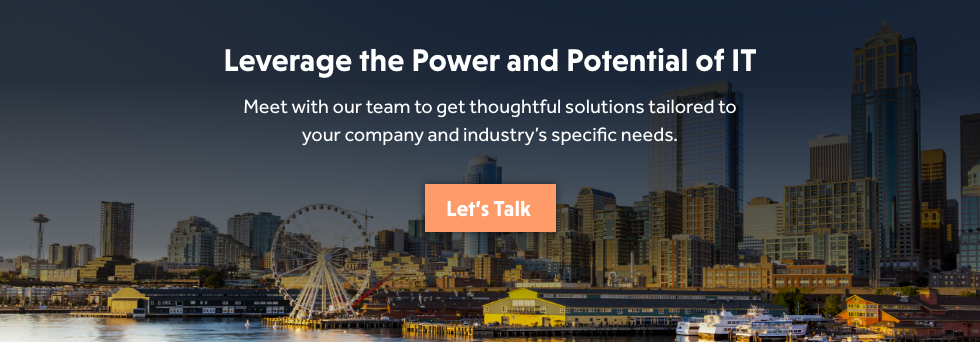Whether you’re at a business, government agency, or nonprofit organization, the process of acquiring the right IT assets will impact your business' efficiency for years to come.
IT procurement necessitates clear, expert leadership to identify needs, assess options, and execute the purchase and implementation. IT assets are a strategic investment, and their acquisition requires specialized knowledge to identify the right solutions for the unique environment you face. You need a highly specialized team to make the best choices – one that knows IT and understands your business objectives.
Managed IT Procurement Will Save You Time and Money
Managed IT services are a core tool in your operations arsenal. From email and phone systems to servers and access points, businesses run on their technology. It’s important to find the right tools to maximize productivity and profitability. To do that, you need an IT procurement expert.
Technology procurement will define the next phases of your business. It’s a commitment to growth, efficiency, productivity, and future profitability, and it pays to have an expert get the order right the first time.
While at first glance it may look like online retailers offer a less expensive alternative for IT procurement, they often lack the ability to add valuable elements such as specialized warranties. They also can’t walk you through installation and implementation or recommend enhanced solutions that truly fit your business operations.
At the end of the day, an IT procurement services specialist will save you time and money and ensure a better, more scalable ROI.
What the IT Procurement Process Looks Like
When done right, the IT procurement process is structured and designed with the sole intent of meeting organizational and user needs. There are three core steps:
1) Product Line
The first step in the procurement process is selecting the right product line. Most major IT manufacturers (think names like Dell, HP, Apple, Aruba, etc.) offer multiple product lines, ranging from personal to commercial to enterprise-grade products.
If you’re a small to mid-sized business, you should avoid purchasing any personal-grade products, since they lack key security features like TPM chips that enable the devices to be encrypted without an external key.
Commercial-grade products are built to a higher standard and have longer product life cycles. For example, while a personal-grade laptop line may tweak internal components every few months, its commercial-grade counterpart will often maintain the same parts for a year or more.
Commercial products also feature higher quality elements, including casings, hinges, and spill-proof keyboards. That means less time and resources wasted on replacing equipment that fails too soon.
2) Needs Analysis
Conducting a thorough needs analysis for each group of IT users is the second step. There is no one-size-fits-all tech solution. A procurement expert will dig deep, get to know exactly how you operate, and identify the tools that will enable you to succeed.
Different departments and managerial levels in organizations generally require different equipment specs. Executives who travel frequently often find more success with smaller, lighter laptops with long battery lives, while finance and accounting teams might need a 10-key on their laptop keyboard. Video and graphics professionals need their own workstations equipped with high-performance devices and dedicated graphics cards.
Each department’s workflow often requires different accessories as well. Needs can look different for every employee and workspace, including docking stations, monitors, cables, speakers, external keyboards, mice, webcams, scanners, and personal printers. Procurement experts make sure every employee has the right equipment and tools they need to move your business forward.
3) Product List
Lastly, a product list is created and submitted to several authorized distributors for special pricing. This is where strategy goes into action. An IT procurement team will approach multiple trusted, authorized distributors to find the purchasing path that best serves your interests. Typically, you’ll get access to discounts on large orders, often up to 5-10% off MSRP, depending on quantities.
It’s imperative to purchase all IT products through an authorized distributor and reseller. This ensures that, should any issues arise, your products are backed by sound warranties and support systems.
You should allow for a reasonable amount of time between placing your order and expected delivery. Many manufacturers are experiencing increased demands for laptops, webcams, and other remote work-friendly tools.
Invest in the Future of Your Business
IT is one of the single most important factors in determining your business’ productivity and success. Leveraging managed IT procurement is a strategic investment in your organization’s future.
An experienced IT procurement partner will ensure that you get exactly what your business needs the first time. They’ll even set up your systems and train your teams to be ready from day one.


